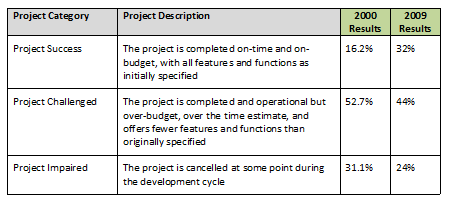With many information technology projects considered failures (see Standish Chaos Press Release) during the last decade, where do we go from here?
When considering implementation of ERP (Enterprise Resource Planning), an organization must determine the best solution for their business operations. Overcoming the challenges presented is critical to have successful implementation of an ERP solution. It’s interesting that many failed ERP implementations have much in common with other large scale IT failures. The following are challenges that have led to troubled, or failed, ERP projects and programs:
- Large scale endeavors affect many departments and business processes. ERP impacts financial areas such as billing, payroll, and core business operations.
- ERP implementations are time consuming, long term projects and complex system implementations involving many interfaces.
- Absence or lack of customer and user participation and involvement as team members and Subject Matter Experts (SMEs), for functional areas and departments
- Incomplete, inadequate, or not mutually agreed upon business and user requirements
- Failing to use clean data and business processes in the problem scope that results in inaccurate or obsolete data and functions (reengineer where required)
- Core team members not having the proper skill sets (soft and hard)
- Risk identification and management have not been thoroughly performed (Identify risks in the beginning and throughout execution for the following areas: technology, organization, processes, and people)
- A communication plan has not been planned and executed for all levels and without the appropriate information and statuses
- The absence of adequate training for the change within the organization and business operations. This issue, along with item 3 & 10, impacts getting users’ participation in focus groups, pilots, etc. to provide input or feedback, including feedback on prototypes and mockups early in the development process.
- The absence of adequate and continuous communications and education about the change within the organization and business operations. Not having consistent organizational readiness for the change that will take place in the culture and with business processes contributes to the failure of programs and projects.
Enterprise Resource Planning is an intense undertaking but does not have to be.

Leave a Reply
You must be logged in to post a comment.